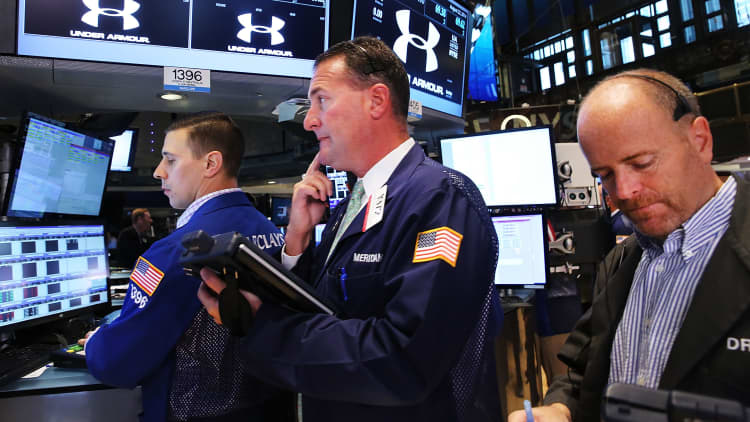
Stock traders are buckled in for another wild ride Thursday.
Thursday's markets could first be in for a fresh dose of positive news on the U.S. economy, after Wednesday's better-than-expected durable goods number showed signs of improved business spending. Second-quarter GDP, at 8:30 a.m. ET, is expected to be revised up sharply from the first read of 2.3 percent.
"GDP, I think will be a nice number. I'm looking for a 3.3, which is one percentage point revision to the first estimate. We can be thankful the U.S. economy is doing better than anywhere else, and we still aren't able to generate inflation, and that's the conundrum for the Fed," said Ward McCarthy, chief financial economist at Jefferies. "I think we'll have this screeching volatility going on until we don't. It's the way these things work. You get these spurts of inanity for a period of days. It finally wears everybody out, and you move back to more normal price behavior."
Read More Seven reasons why the market has gone totally nuts
After five days of gut-wrenching, triple-digit declines, the Dow surged 619 points into Wednesday's close, finishing the day at 16,285. The S&P 500 was up 72 at 1,940.
"This is what happens after those types of declines. Volatility around huge market moves, like what was seen in the last few sessions, is not unusual," said Dan Greenhaus, chief global strategist at BTIG. "Down moves, up moves, this is entirely in line with what history shows. The question for investors, is what happens after the volatility … in that regard, the bias is still higher."
Stocks were set up to open higher Wednesday, but were helped by the durable goods report and comments from New York Fed President William Dudley, who said the case for a rate hike in September has become less compelling. However, he did not say September was off the table, and that the Fed would review data and market conditions.
Read More Need a safe haven? Look at these assets
Bonds sold off Thursday in volatile trading, with the 30-year yield moving up to 2.93 in late trading from 2.78 percent.
"The price action today was very much related to the fact that U.S. equities were able to get off the mat. I think in this environment also what's happening, is the level of uncertainty has risen quite significantly in the last couple of weeks," said McCarthy.
Besides GDP, there is also jobless claims at 8:30 a.m. ET and pending home sales at 10 a.m.
McCarthy is in the camp that has been expecting a December rate hike, and he said the continuing drop in commodities prices has been reinforcing that view. Market expectations have moved toward December though some economists have been mentioning the possibility of an October hike.
Read More Stocks leap about 4% in recovery, best day since 2011
Traders will be watching headlines from Jackson Hole, Wyoming, where Fed officials and others are gathering for the annual summit. A highlight will be a speech from Fed Vice Chairman Stanley Fischer on Saturday, and he may add to the debate.
Bank of America Merrill Lynch economists still say September is possible. "It's getting interesting. For some time, our view has been that absent a shock or a sharp slowing in the data, the Fed would hike in September. The data are cooperating," they wrote in a note. "We expect 2Q GDP growth to be revised up from 2.3 to 3.4 percent … and we continue to track 2.8 percent growth in 3Q. More important, the Fed is clearly putting a big emphasis on the labor market and they are getting just what they want."
Read More Here's the 'key' to a real rally: Expert
The BofA economists note that only a few firms have shifted their view away from September, but if the Fed delays, a big delay is unlikely. "If the Fed met today, they would very likely take a wait-and-see attitude and delay hiking. Why create further market volatility? Why not wait to see whether this is an economically important shock?" They also point out there are three more weeks before the Fed has to decide.
"If the market stabilizes, the Fed outlook will feel a lot different," they noted.


